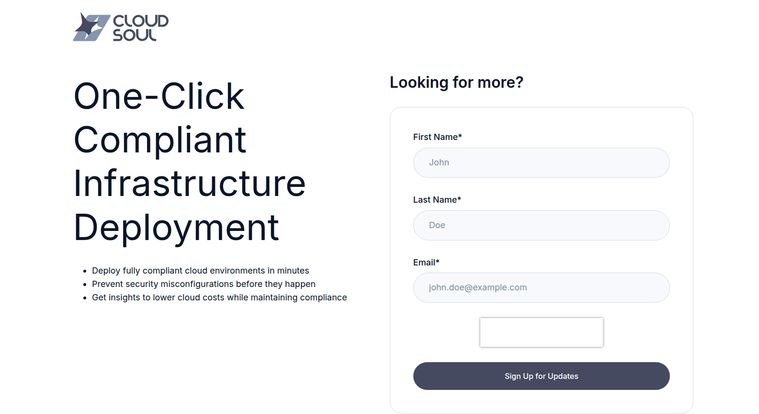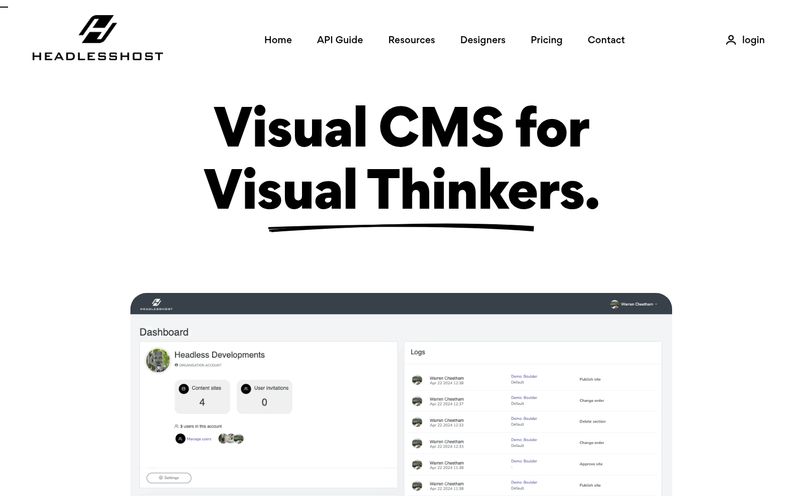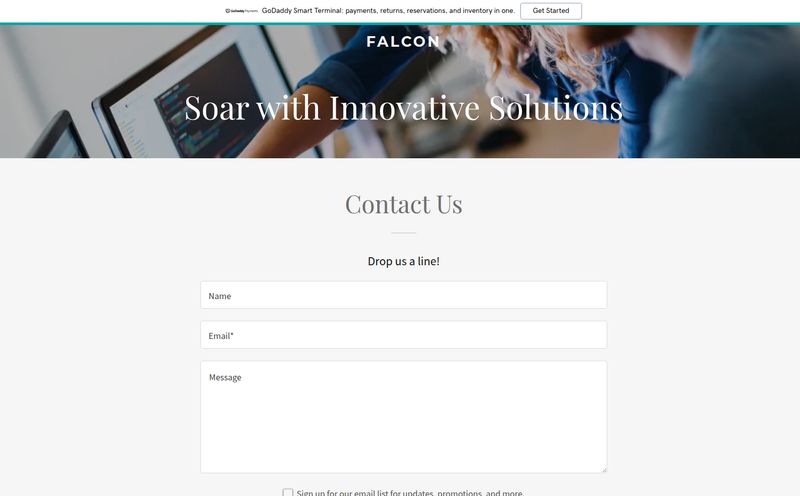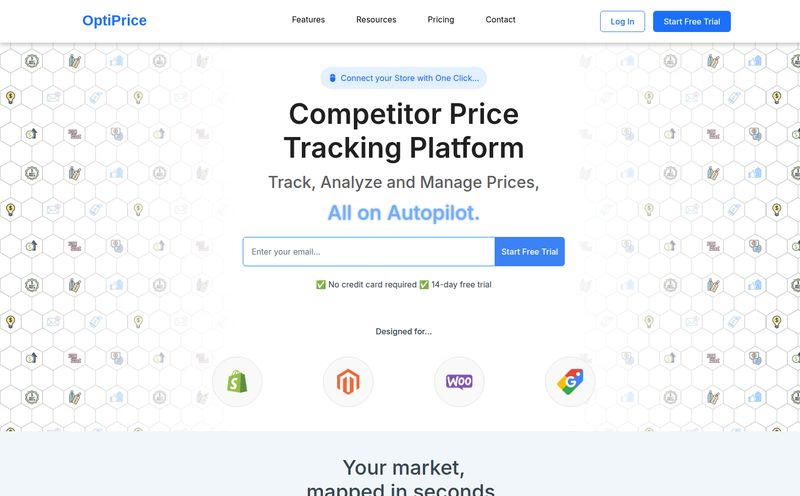If you've ever had to set up cloud infrastructure, you know the feeling. Staring into the abyss of AWS, GCP, or Azure, with a thousand services blinking back at you. You're wrestling with Terraform files, getting lost in YAML configurations, and praying you didn't just open up a security hole the size of Texas. It’s powerful, sure. But it’s also a massive headache, especially if you're not a full-time DevOps engineer.
It's a process that feels like it was designed by engineers, for engineers. And for years, we've just accepted it as the cost of doing business in the cloud. But what if it didn’t have to be that way? What if you could just… ask for what you want? In plain English.
That's the promise of a new tool I stumbled upon recently called CloudSoul. It popped onto my radar with a bold claim: One-Click Compliant Infrastructure Deployment. My internal cynic-o-meter, honed by years of marketing fluff, immediately went on high alert. But my curiosity got the better of me. An AI that just gets it? I had to look closer.

Visit CloudSoul
So, What Exactly is CloudSoul? (And Why Should You Care?)
At its heart, CloudSoul is a SaaS platform that wants to be your cloud infrastructure translator. Instead of you learning the arcane language of cloud services and IaC (Infrastructure as Code) tools, you tell CloudSoul what you need in natural language, and its AI does the heavy lifting. Think of it less like being a mechanic and more like telling your smart car, "Take me to the nearest coffee shop." You state the intent, and the tech figures out the route.
The core idea is to abstract away the how so you can focus on the what. You need a staging environment for a new web app with a database and a load balancer, that also happens to be SOC 2 compliant? In theory, you just ask for it. CloudSoul’s AI is designed to interpret that request, spin up the necessary resources in the right configuration, and ensure all the compliance boxes are ticked.
This isn't just about convenience. It’s about tackling three of the biggest demons of cloud management: complexity, security, and cost.
The Core Promises: A Closer Look at CloudSoul's Features
When a tool makes big claims, I like to break them down. It’s easy to get swept up in the vision, but the devil, as they say, is in the details.
One-Click (Or One-Sentence?) Deployment
The main event, right? The idea of deploying entire environments in minutes is the dream. For anyone who has spent a day (or a week) debugging a tricky Terraform module, the appeal is obvious. This dramatically lowers the barrier to entry. Your junior dev, your product manager, even your non-technical founder could potentially spin up a test environment without pulling a senior engineer away from their work. It’s a huge potential boost for agility and speed.
The Automatic Compliance Guardian
This might actually be the most important feature. Seriously. Achieving and maintaining compliance (think HIPAA, SOC 2, GDPR) is a nightmare. It’s a constant, soul-crushing battle against misconfigurations. A single wrong setting on an S3 bucket can lead to a data breach that makes headlines. According to a 2023 IBM report, cloud misconfigurations are a leading cause of breaches.
CloudSoul's approach is proactive. Instead of using a separate tool to scan for mistakes after they've been made, it aims to build the infrastructure correctly from the start, based on established compliance frameworks. It's like having a compliance officer looking over your shoulder and gently guiding your hand, preventing the mistake before it ever happens. That's a huge shift in mindset.
Keeping Your Cloud Bill From Giving You a Heart Attack
Ah, the cloud bill. The gift that keeps on giving. We've all heard the horror stories of a developer leaving a high-powered instance running over the weekend and coming back to a bill that could fund a small nation. CloudSoul claims to provide insights to lower costs while staying compliant. This means it's not just spinning up resources, but hopefully doing it intelligently—choosing the right instance sizes, recommending savings plans, and flagging idle resources. If it can deliver on this, it could pay for itself pretty quickly.
Let's Be Real: The Good, The Bad, and The AI
No tool is perfect. As an SEO guy, I'm naturally skeptical and I've seen enough platforms come and go to know you have to look at the full picture. The concept is fantastic, but the execution is everything.
The advantages are pretty clear. It's a massive simplification of a complex process, potentially saving teams tons of time and money. The built-in compliance and security guardrails are a godsend, especially for smaller companies without a dedicated security team. It makes the cloud more accessible to more people. That’s a win.
But, let's talk about the potential gotchas. My main concern is the same one I have for many AI-driven tools: the black box problem. How much do you have to trust the AI? If you ask for a "small, secure server," does its definition of "small" and "secure" match yours? What if there's a nuance in your request it misses? The dependency on the AI's accuracy is significant.
Then there's the customization trade-off. The beauty of tools like Terraform is their infinite flexibility. You can tweak every last setting. A platform like CloudSoul, by its very nature, will likely offer less granular control. For 80% of use cases, that’s probably fine. But for the power users and complex edge cases, it might feel restrictive. It's the classic simplicity vs. control dilemma.
And of course, you're tying your infrastructure management to their platform. That's a level of vendor lock-in that requires a lot of trust.
Who is This Tool Actually For?
Based on what I've seen, I have a pretty good idea of the ideal CloudSoul user.
- Startups and SMBs: Teams that need to move fast but don't have a dedicated DevOps army. This could let them punch way above their weight class.
- Development Teams: Any developer who just wants to quickly spin up a QA or staging environment without submitting a ticket and waiting two days.
- Companies in Regulated Fields: Anyone in finance, healthcare, or government who lives in constant fear of the compliance auditors. This could be a lifeline.
Who is it probably not for? The grizzled sysadmin who has their own custom-built library of IaC modules and dreams in shell scripts. They might find it too simplistic. But for the rest of us? It’s pretty compelling.
The Million-Dollar Question: What's the Pricing?
Here's where things get interesting. I went looking for a pricing page, and... poof. Nothing. I even hit a 404 page, which in this day and age tells me a product is likely very new or still in a sort of stealth/beta mode. The landing page pushes you to "Sign Up for Updates" rather than "Buy Now" or "Start Free Trial."
So, for now, the cost is a mystery. My gut tells me they're probably running an early access program, gathering feedback before a public launch. This is your chance to get in on the ground floor, so if this sounds interesting, I'd definitely drop your email in their form.
Your CloudSoul Questions, Answered
How does CloudSoul actually use natural language?
It uses advanced AI models, likely similar to the tech behind things like ChatGPT, to parse your requests. You'd type something like, "Deploy a production-ready web server for a Node.js application in us-east-1 with a PostgreSQL database and daily backups." The AI interprets the entities (Node.js, PostgreSQL, us-east-1) and intents (deploy, backup) to generate the necessary cloud configuration.
What cloud providers will CloudSoul support?
While not explicitly stated, any serious player in this space would have to launch with support for the big three: Amazon Web Services (AWS), Google Cloud Platform (GCP), and Microsoft Azure. It's safe to assume they are the primary targets.
Is CloudSoul a full replacement for tools like Terraform or Pulumi?
For many common use cases, it aims to be. However, for highly complex, bespoke infrastructure, you might still need the power and control of a traditional IaC tool. Think of CloudSoul as the 90% solution that handles most day-to-day needs with incredible ease, while Terraform remains the tool for that tricky 10%.
How does CloudSoul really keep things secure?
It's based on the principle of "secure by default." The AI builds infrastructure based on pre-vetted, compliant templates and best practices. By automating the setup, it eliminates the most common source of security vulnerabilities: human error. It prevents misconfigurations before they are deployed, which is a much safer approach than finding them later.
Can I try CloudSoul now?
As of this writing, it appears to be in a pre-launch or private beta phase. The best course of action is to visit their website and sign up for updates. This will likely put you on the list for early access or a notification when they launch publicly.
Is CloudSoul the Future or Just a Fantasy?
So, what's my final verdict? I'm cautiously optimistic. Very optimistic, actually. The idea behind CloudSoul is spot on. It addresses real, painful problems that plague development teams every single day. The thought of abstracting away the sheer complexity of modern cloud infrastructure is more than just appealing; it feels inevitable.
Of course, the success of CloudSoul will hinge entirely on its execution. The AI needs to be smart, reliable, and trustworthy. But if they can pull it off, it could genuinely change how we interact with the cloud. It would be a move from being a cloud mechanic to a cloud architect, focusing on the blueprint instead of turning the wrenches.
I’m keeping a close eye on this one. The idea of ditching my YAML cheat sheets for plain English? Well, I've already signed up for their updates. Maybe you should too.
Reference and Sources
- CloudSoul Official Website: (Note: As of publishing, this is a landing page for updates) - [A placeholder link would go here, as none was provided]
- IBM Cost of a Data Breach Report 2023: https://www.ibm.com/reports/data-breach
- An Introduction to Infrastructure as Code (IaC): https://www.redhat.com/en/topics/automation/what-is-infrastructure-as-code-iac



